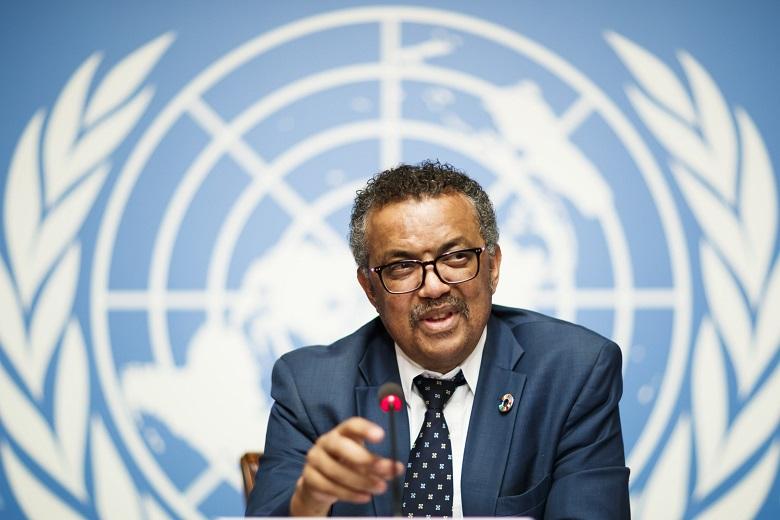However, the head of the WHO, Tedros Adhanom Ghebreyesus, expressed concern after the publication of the World Health Organization’s weekly epidemiological report. Despite record numbers of cases in several countries, WHO believes that “2022 may be the year when we end the acute phase of the pandemic”.
The COVID-19 pandemic has soared with a record number of cases worldwide in the last seven days due to Omicron, a highly contagious variant that poses a “very high” risk, the World Health Organization (WHO) warned Wednesday.
With 935,863 new cases per day on average in the last week, according to a count by the AFP news agency based on official figures, the virus is now circulating at an unprecedented rate. This figure is significantly higher than the previous record, reached between April 23 and 29, with 817,000 cases per day, and represents an increase of 37% compared to the previous week.
“The overall risk associated with the new Omicron variant remains very high,” the WHO warned in its weekly epidemiological report, noting that its growth requires “a period of two to three days to double.”
According to its director-general, Tedros Adhanom Ghebreyesus, the “tsunami” created by the simultaneous circulation of the Delta and Omicron variants is bringing “health systems to the brink of collapse”. Most new infections have been counted in Europe, where several countries recorded new all-time highs on Tuesday and Wednesday.
Still, WHO sees the future in a good light. “I remain optimistic that 2022 can be the year when we not only end the acute phase of the pandemic but also build the road to better health security,” Ghebreyesus told a press conference.
One figure that invites some hope is the fact that last week cases in South Africa, the country where the omicron variant was first detected, fell by around 30%, according to data from the latest WHO epidemiological report. “We are confident that cases will fall in other countries as they have in South Africa,” said WHO’s Director of Health Emergencies, Mike Ryan, who was also optimistic about the coming months, provided that the race for a more equal distribution of vaccines continues.
“It is difficult for the virus to be completely eliminated, but it will possibly shift to a lower level transmission pattern, causing occasional outbreaks in unvaccinated populations,” the Irish expert predicted. “Hopefully, that will be the end, but we are certainly not there yet, and there are still hurdles that we hope to overcome by achieving equity in vaccine delivery,” he added.
More record infections
In France, 208,000 new cases of COVID-19 were reported in the last 24 hours, not far behind the United States, which on Tuesday posted a record weekly average of 265,427 cases per day, according to Johns Hopkins University.
Denmark is currently the country globally with the newest cases relative to its population: on Wednesday, it smashed its all-time record by recording 23,228 new infections in 24 hours. The Danish incidence means that more than one in every 60 people tested positive last week.
In the United Kingdom, some 130,000 additional cases were counted on Tuesday in England and Wales, and the country has launched a massive booster vaccination campaign that has already given supplementary doses to 57% of those over 12 years of age. According to the British Prime Minister, Boris Johnson, 90% of the COVID-19 patients admitted to intensive care did not have this third dose.
In Spain, where nearly 100,000 cases a day have been reported, the government announced that it would reduce quarantine from ten to seven days for infected persons because of the need to strike a balance between “public health” and “economic growth”, said President Pedro Sanchez.
The upturn in infections has reached Latin America and the Caribbean, where the epidemic seemed to be on the decline until recently. Now infections are on the rise in the region, accumulating more than 47 million infections and close to 1.6 million deaths. This increase coincides with reports of an increase of the Omicron variant in Panama, Colombia, Chile, Argentina, Brazil, Paraguay, Venezuela, Mexico, Cuba, and Ecuador. For example, cases have increased six-fold in Argentina since the beginning of the month.
New restrictions
The Omicron variant appears to cause fewer hospitalizations than the hitherto dominant Delta variant, according to early studies, but some experts point out that greater contagion may cancel out the advantage of its being less dangerous. Faced with an accelerating pandemic, governments are trying to strike a balance between controlling the spread of the disease and containing the economic damage.
Finland has banned entry to unvaccinated foreign travelers; Sweden, Denmark, and Austria require non-residents to have a negative test and vaccination; and France will limit the validity of the “health passport” to vaccinated persons.
In addition, France announced the “compulsory” use of teleworking “whenever possible”, the prohibition of standing concerts, and discotheques’ closure for three additional weeks.
Germany, for its part, will apply new restrictions such as limiting meetings to ten people for those vaccinated and two for those unvaccinated, closing nightclubs, and holding sporting events behind closed doors.
China, which is suffering a major outbreak 40 days before the Beijing Winter Games, confined tens of thousands more people on Tuesday. After the northern city of Xi’an was placed under strict quarantine for a week, several tens of thousands of residents in a district of the city of Yan’an, 300 kilometers from Xi’an, were confined on Tuesday.
The COVID-19 pandemic has left more than 5.4 million people dead worldwide since December 2019, according to a Wednesday count by AFP from official sources, but the WHO believes the toll could be two to three times higher. Likewise, more than 282 million cases have been officially recorded since the start of the pandemic.
